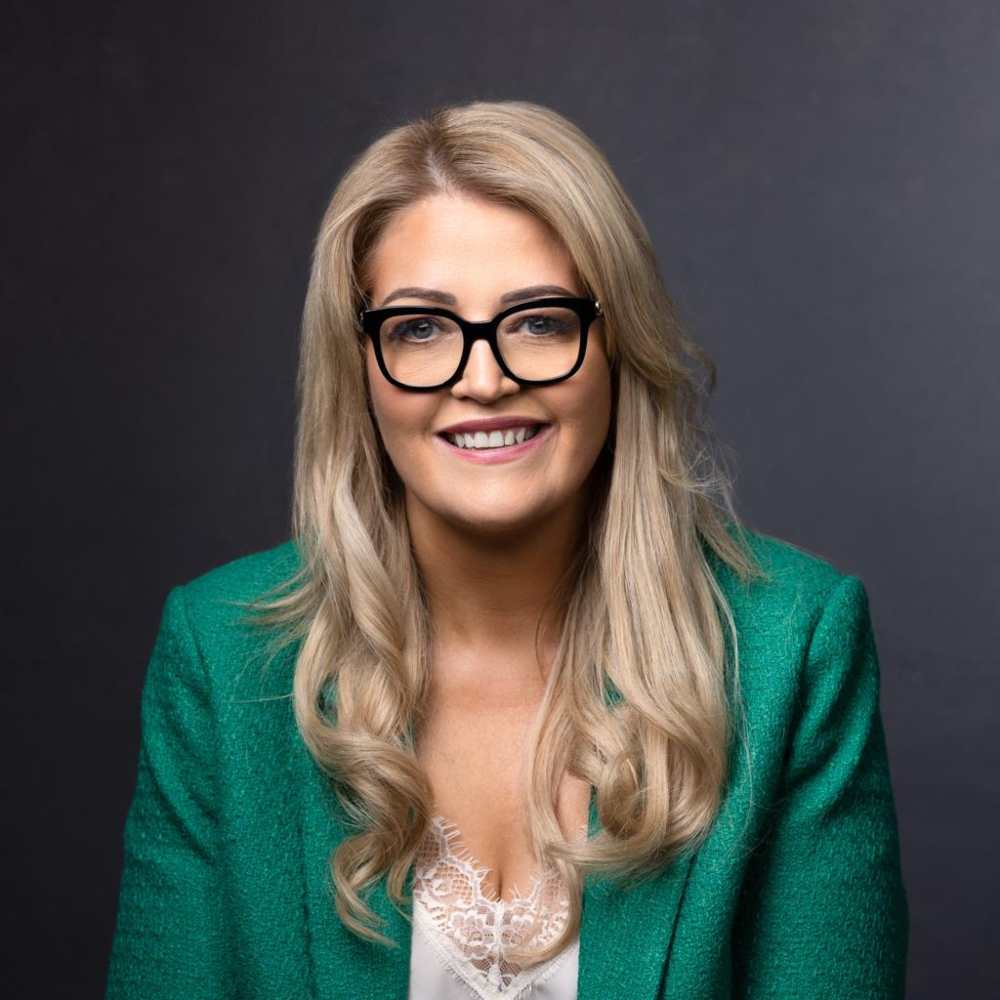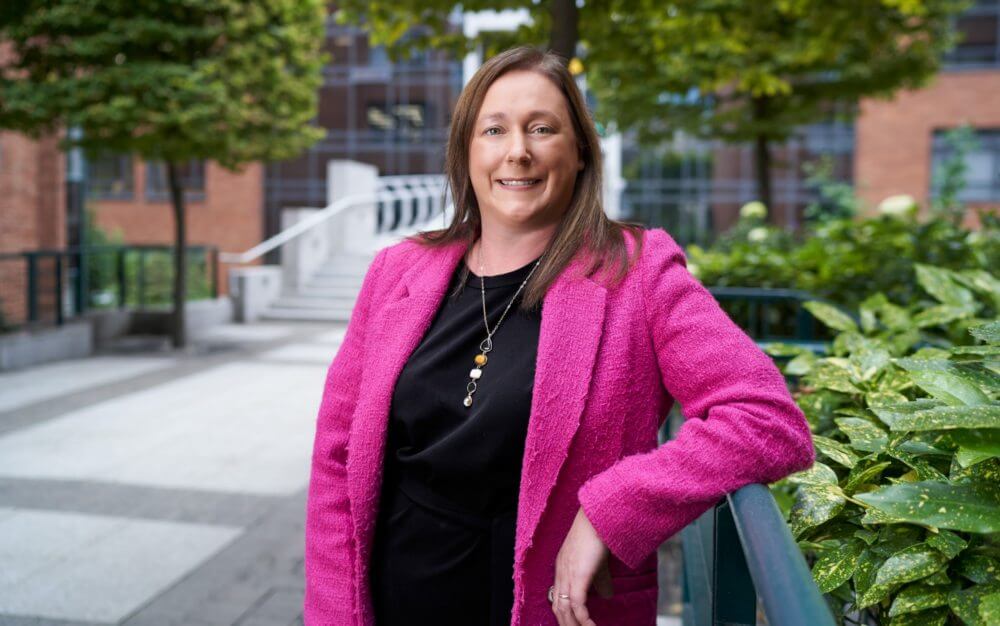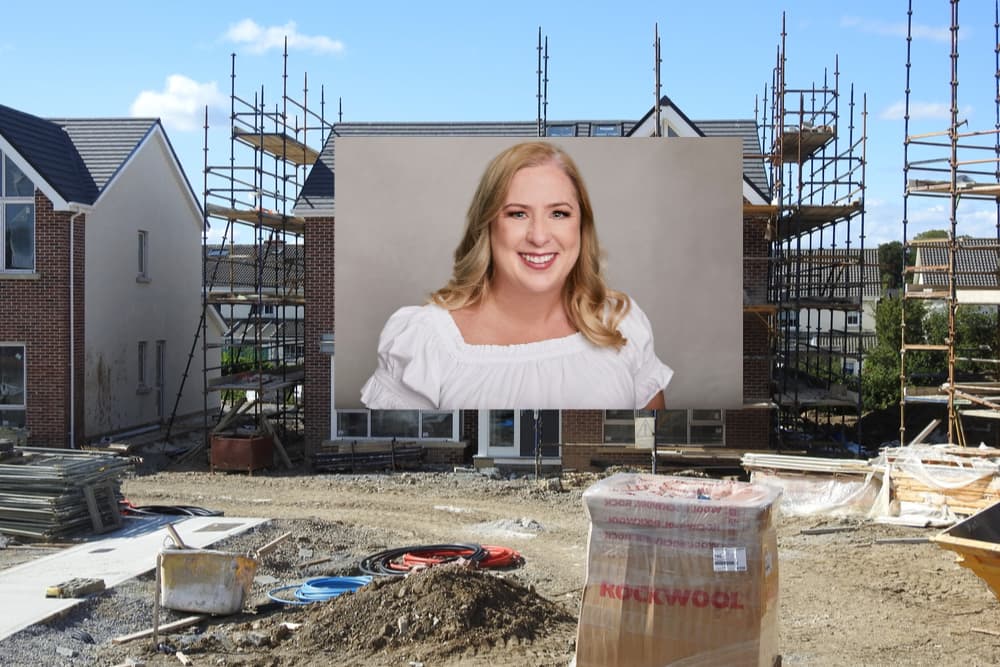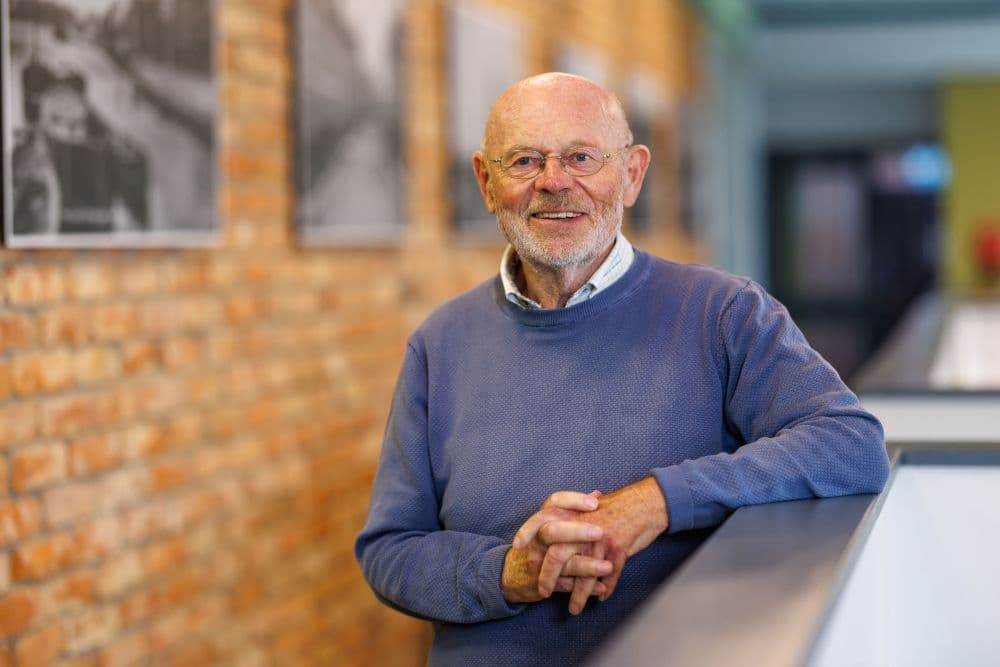Hillary Collins from PHX shares her life and her business lessons.
Hillary is the People & Culture director of PHX Ireland.
Her role encompasses strategic human resource management, team development, and fostering a positive and inclusive work environment.
“I bring strategy and humanity together. My style is warm, clear, and calm – and through my team, we shape the tone and culture of the business”
PHX was acquired by the PHOENIX group in 2022. The PHOENIX group is active in the pharmaceutical wholesale and pre-wholesale business areas with 224 sites in 29 countries supplying pharmacies, doctors, and medical institutions with medicines and health products. Around 17,000 pharmacies in 18 countries are members of one of the PHOENIX group’s partnership and cooperation programmes.
Tell us about your background – what journey did you take to arrive at where you are?
While my journey has taken me across Europe and into boardrooms, it all started in Ballymahon, Co Longford, as the middle child of seven in a close-knit community. That grounding taught me work ethic, humility, and the value of knowing your neighbour – values I bring into every decision I make as a leader.
I began with a degree in Commerce before earning MScs in both Marketing Practice and later in Strategic HR Leadership. Since then, I’ve led people functions across pharma, semi-state, and FMCG across Europe, from United Drug and Calor Gas to Owens & Minor and the Walden Group. These roles brought me to executive tables where culture and strategy intersect, and where people are central to business success.
In 2022, I returned to where my HR career began, PHX Ireland — the parent company of United Drug. As Director of People & Culture, I now lead a talented team focused on aligning 2,500 teammates across community pharmacy, homecare nursing, and pharmaceutical supply chain around a shared, people-first purpose — so they feel included, energised, and valued, regardless of role or location.
Why are you doing what you are doing? What need are you meeting? What’s your USP?
Life isn’t always easy, especially as we all continue to navigate the realities of work-life balance in a post-Covid world. I see my role not just as a function head, but as someone who contributes directly to our end destination, ensuring that from an overarching business strategy perspective, we have the right people, with the right support, in the right roles to deliver for our patients, our communities, and each other.
“We’re shaping our services around the evolving needs of pharmacies, hospitals, and patients, ensuring that we don’t just deliver healthcare – we collectively deliver health”
I believe deeply in creating safe, energising workplaces where people feel seen, heard, and supported. Our sector can be intense. It’s fast-paced, operationally complex, and deeply human; whether we’re meeting someone in their local pharmacy or in their home through our nursing and care services, it’s often during their most vulnerable moments. That’s why I view my role as one that balances ambition with empathy.
My USP? I bring strategy and humanity together. My style is warm, clear, and calm — and through my team, we shape the tone and culture of the business. We actively remove obstacles, welcome difficult conversations, and lead with intent, not ego. Progress over perfection is our motto.
What are your growth plans?
PHX Ireland Group is part of the wider PHOENIX group – Europe’s leading healthcare provider – but we lead with a distinctly local strategy. Our group includes United Drug, Ireland’s leading pharmaceutical wholesaler and distributor; McCabes Pharmacy, the country’s largest pharmacy network with 110 stores; and TCP Homecare, specialists in clinical home nursing and direct-to-patient delivery. Together, we’re committed to supporting our customers and making a meaningful difference to patients, communities, and each other.
Since joining the PHOENIX group in 2022, we’ve gained access to international expertise, insights, and innovation across 29 markets and over 17,000 pharmacies. This global perspective strengthens our local ambition to grow through innovation in pharmacy services, healthcare logistics, and homecare – always focused on excellence, efficiency, and sustainability. We’re shaping our services around the evolving needs of pharmacies, hospitals, and patients, ensuring that we don’t just deliver healthcare – we collectively deliver health.
What are your key skills and qualities that set you apart?
“Throughout university, I worked in fast food restaurants, acted as a tour guide, and even served as a ward orderly in a psychiatric hospital. These weren’t just jobs they were windows into humanity”
I’m a high-energy, change-focused leader who doesn’t shy away from the tough stuff. I ask bold questions while ensuring people feel heard in the process. Whether it’s driving digital transformation, resolving complex industrial relations issues, integrating cultures pre- and post-acquisition, or hiring senior leaders, I bring presence, empathy, and clarity to the table.
Leadership, for me, isn’t about volume — it’s about creating space for the next conversation. As Jefferson Fisher puts it, “Leadership isn’t about talking louder — it’s about listening better.”
I’m down-to-earth, led by common sense, and fully at ease with who I am; flaws and all. That self-acceptance gives me great freedom as a leader. It means I can lead without defensiveness, connect authentically, and create space for others to do the same.
What (or whom) has helped you most along the way?
Growing up in rural Ireland with the backdrop of boglands and tight-knit community, I always knew I wanted more; not just in terms of career, but experience, learning, and the world beyond my own. My parents raised seven children on one salary. Money could be tight, but belief was not. My parents instilled in us the values of problem-solving, resilience, work ethic, and the idea that anything is possible if you show up and give your best.
“Whether you’re in a boardroom or having a one-to-one feedback conversation, your ability to remain grounded, present, and respectful is often the deciding factor. These aren’t ‘soft skills’ – they’re essential leadership strengths”
Throughout university, I worked in fast food restaurants, acted as a tour guide, and even served as a ward orderly in a psychiatric hospital. These weren’t just jobs they were windows into humanity. I met people from every walk of life, heard their stories, and developed a deep respect for difference and a fascination with culture, nuance, and what shapes human behaviour.
I’m also not afraid to say I’ve worked incredibly hard to earn my place in this industry. I asked the questions others didn’t, I volunteered for cross-functional projects, and I leaned into the messy middle where real growth happens. When others stopped looking for solutions, I kept going. I travelled. I showed up. I never stopped learning.
I still don’t. I’m an avid reader, I listen to podcasts, I reflect on our own initiatives, and I’m not afraid to take nuggets from others who’ve delivered better I believe leadership is about always being a student of what’s possible.
What was the greatest piece of business advice you ever received?
Three pieces of advice have shaped how I lead and how I show up especially in high-stakes or emotionally charged situations.
You don’t have to attend every argument you’re invited to”: Not every moment requires your reaction. Sometimes, the most powerful thing you can offer is composure. It’s about choosing where to invest your energy.
“If they wanted to, they would.” It’s a simple truth that keeps me grounded. When someone doesn’t follow through or show up in the way you hoped, it’s rarely about you — it’s about their priorities and capacity. This helps me lead with empathy, not ego, and to let go with clarity and grace.
“No response is a response.” In a world of instant feedback and urgency, silence can speak volumes. Whether in leadership or negotiation, knowing when not to engage is as important as knowing when to speak up. It’s a sign of emotional maturity, not weakness.
These principles help me stay focused on what matters — building trust, not just winning moments.
What circumstances/qualities/events can mark the difference between success or failure in life or business?
It comes down to a few fundamentals: emotional regulation, self-awareness, resilience, and clear communication. Whether you’re in a boardroom or having a one-to-one feedback conversation, your ability to remain grounded, present, and respectful is often the deciding factor. These aren’t “soft skills” – they’re essential leadership strengths.
Over time, I’ve also learned the importance of protecting my peace. At times I gave too much and overextended, which benefits no one. Leadership isn’t about being everything to everyone; it’s about setting boundaries that allow you to lead sustainably.
When I face setbacks, I ask myself:
- Did I lead with integrity?
- Could I have done something differently?
- Is the feedback coming from a place of positive intent — and is there truth in it?
If I can answer those questions with honesty, and if I know I showed up with intention and gave my best, then I see failure not as defeat but as a diversion toward something better aligned. Sometimes, redirection is just another form of progress.
What was the most challenging aspect of growing the business?
One of the greatest challenges and most rewarding has been harmonising legacy cultures across a group of previously independent businesses, each with its own identity, pace, and way of working.
“A crisis can either harden an organisation or humanise it. We chose the latter”
Harmonisation isn’t about enforcing sameness it’s about building a shared language, aligned behaviours, and a unifying sense of purpose that respects what came before and what’s possible next. We have been successful in doing that through the roll out of common values and our people strategy.
In more recent years, a key part of my role has been supporting our people to “get to know” new international owners, especially during acquisition and integration phases. That takes trust-building and clear communication. For many, it meant opening their minds and hearts to a new way of thinking and taking a leap of faith in what could be possible. My job and my team’s was to accelerate that courtship in a human, authentic way; creating moments of connection outside of spreadsheets and boardrooms
And we’ve done just that. It’s been hugely positive and collaborative, but it required courageous conversations, deep listening, and consistent presence. I’ve learned that culture work is delicate and deliberate it’s not transactional. It’s about creating space where people feel safe enough to evolve.
How did you navigate the pandemic and what lessons did you learn?
We led with transparency, empathy, and steady communication. In a time of global uncertainty, our people didn’t need perfection they needed to feel seen, supported, and safe. We provided regular updates, flexibility where possible, and kept the lines of communication open not just for information, but for reassurance.
“Digital tools are most powerful when they amplify trust, accessibility, and culture, not just productivity”
Post-COVID, new challenges emerged. Restrictions on movement across EU member states had a real impact particularly in pharmacy and warehousing, constraining talent pipelines . Rather than panic, we paused and reflected. We shifted our focus to retention and internal growth, asking: How do we develop and support the talent we already have?
This led to a broader question — with over 70% of our workforce being women, are we really supporting them through all stages of life? That reflection led to the creation of life-stage policies:
- Fertility supports
- Leave for pregnancy loss and miscarriage
- Menopause education and support
- Female mentorship and networking events
The lesson: A crisis can either harden an organisation or humanise it. We chose the latter. By listening deeply and responding meaningfully, we’ve come out of the pandemic with stronger people connections and a more inclusive culture.
How has digital transformation influenced your journey?
Digital transformation has been a catalyst – not just in implementing systems like Human Resources Information System (HRIS) or e-learning platforms, but in fundamentally shifting our mindset toward agility, responsiveness, and data-informed decision-making.
We are early days in our AI journey, but I see great opportunities for it to support us in workforce planning, and operational efficiency; but the real impact lies in how we use tech to enhance the human experience. Platforms like Workvivo have been transformative. They don’t just share updates – they bring leadership to life. They allow teammates to see, hear, and engage with business priorities in real-time, turning roles into personalities and bridging gaps in large, distributed organisations.
But I hold this truth closely: no technology replaces a meaningful conversation. The best tech should create space does not replace it for human connection. Digital tools are most powerful when they amplify trust, accessibility, and culture, not just productivity.
If you were to do it all over again, what would you do differently?
I used to believe that I needed to have all the answers or fix everything myself, but I’ve since learned that productive conflict is healthy when it’s grounded in respect, and that being vulnerable is not a weakness, it’s a strength.
I’ve also learned not to be so hard on myself. I now remind myself: Other people’s urgency is not my emergency. I don’t always have to be the fixer, the solution provider, or the person carrying the emotional load. Sometimes, stepping back is just as powerful as stepping in. Boundaries, self-compassion, and trusting others to rise, these are things I’ve grown into as a leader and they’ve made me better.
Who inspires you in business today?
I’m inspired by women who lead with strength and softness, especially in spaces that haven’t always welcomed them.
- Suzanne Eade, CEO of Horse Racing Ireland; who has modernised a male-dominated sector with humility and impact, leading with presence not noise
- Aimee Connolly, founder of Sculpted by Amy; an entrepreneur building a brand rooted in authenticity and connection, who shows up genuinely and listens deeply
- Caroline Hirons; bold and unapologetically herself, proving you can be true to who you are and build a powerhouse brand with confidence and clarity
It’s important for role models to exist who are not afraid to stand out in colour, who bring personality and courage into their leadership. These women remind me that bravery comes in many forms and that there’s room for all of us at the table, just as we are.
What advice do you give new hires and how do you nurture talent?
Be curious, be kind, and be ready to stretch yourself. We support our people with mentoring, management development programs, Inclusive employee forums. You own your own career so be in the driving seat.
What business books do you read or recommend?
Start With Why – Simon Sinek
Why Should Anyone Be Led by You? – Goffee & Jones
The Next Conversation: Argue Less, Talk More – Jefferson Fisher
Each one explores leadership from a different lens — purpose, presence, communication, and culture.
What technologies/tools help keep you on track?
Does my Nespresso machine count? Because that’s absolutely the first thing I switch on every morning closely followed by LinkedIn, which helps me stay connected to people, ideas, and trends that shape my thinking.
“Tech alone doesn’t build trust. It doesn’t foster belonging or solve cultural misalignment. The organisations that thrive will be those that marry digital fluency with emotional intelligence; where data informs, but people still decide”
At work, we’re well into our HRIS Roadmap, focused on digitising our ways of working to enhance agility, connection, and data-led decision-making. In the past 12–18 months, we’ve implemented:
- Speakap, to connect with teammates outside of central or desk-based roles making communication more inclusive and real-time.
- Poppulo, a communication tool providing data on insights on how our messages land
- A new Applicant Tracking System (ATS) to streamline and strengthen our talent acquisition efforts.
- A refreshed e-learning platform to support on-demand development.
And we’re proud to be part of a European HRIS pilot, trialling new system capabilities that will futureproof how we manage talent, payroll, and people data across the group.
These tools aren’t just automation; they amplify connection, remove friction, and free people to focus where it counts: with each other and our patients.
What social media platforms do you prefer and why?
LinkedIn is my go-to. Its where strategy meets story. I use it to stay connected to industry trends, share wins and lessons, and keep a pulse on what’s resonating across the business world.
I also enjoy the more conversational, real-time tone of Instagram, especially when it comes to accessible lifestyle content.
And while it’s not social media in the traditional sense, Spotify is a daily companion. I listen to podcasts for both learning and laughter — favourites include The Dish, My Therapist Ghosted Me, and The Mel Robbins Podcast. It’s a way to reset my thinking, stay curious, and sometimes just switch off and enjoy the moment.
What are your thoughts on the future of tech in business and your sector?
Technology is going to keep reshaping how we work particularly in HR. AI, analytics, and automation are already helping us forecast talent needs, personalise learning, and get real-time insights on engagement. That’s powerful.
But tech alone doesn’t build trust. It doesn’t foster belonging or solve cultural misalignment. The organisations that thrive will be those that marry digital fluency with emotional intelligence; where data informs, but people still decide. We have to lead with the human in mind and use tech to enable connection, not replace it.
What advice would you give your 21-year-old self?
Don’t race to prove yourself. Let your actions speak for themselves. Speak less, listen more, and never confuse urgency with importance ; your time and energy are precious.
You don’t have to be the fixer in every situation. You don’t need to be the loudest to be heard. The real goal is to build the kind of presence that people trust especially in conflict, especially in uncertainty.
Everyone wants to feel special, and you lead with heart, you will learn this is your super power. And most of all: protect your peace. That’s not weakness it’s wisdom.
-
Bank of Ireland is welcoming new customers every day – funding investments, working capital and expansions across multiple sectors. To learn more, click here
-
For support in challenging times, click here
-
Listen to the ThinkBusiness Podcast for business insights and inspiration. All episodes are here. You can also listen to the Podcast on:
-
Spotify
-
SoundCloud
-
Apple






